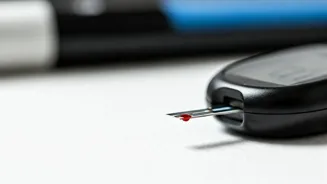Early Morning Struggles
Prediabetes often presents with subtle symptoms that might be mistaken for everyday issues. The timing of these symptoms, especially in the morning, is significant.
Early morning is when our bodies are most sensitive to blood sugar fluctuations. During this time, the liver releases glucose, which, in a prediabetic state, can cause a noticeable increase in blood sugar levels. Experiencing any of these symptoms upon waking could signal an underlying problem and necessitate further investigation. The key is awareness; understanding these potential signs can prompt timely action and improve health outcomes. Recognising and responding to the body's signals early on becomes crucial, to effectively manage or even reverse the progression towards full-blown diabetes. This knowledge can empower individuals to take proactive steps and seek appropriate medical guidance.
Excessive Thirst
Waking up with an unquenchable thirst is a common symptom of high blood sugar, a hallmark of prediabetes. The body tries to eliminate excess glucose through urine, leading to increased urination. This frequent urination dehydrates the body, triggering intense thirst. The persistent need to drink water, even after hydrating the night before, is a significant indicator. This is due to the kidneys working overtime to process and excrete the excess glucose, causing the individual to lose more fluids. If this cycle continues over time, it can lead to dehydration and disrupt electrolyte balance. Being mindful of this symptom, especially when it persists or gets worse, can guide proactive health management decisions and trigger timely medical advice. Consistent monitoring of these symptoms can help keep prediabetes under control.
Frequent Urination
Increased urination, particularly at night, is another critical warning sign. When blood sugar levels are elevated, the kidneys work harder to filter and reabsorb glucose, causing it to spill into the urine. This process draws extra water, leading to increased urine production and the need to urinate more often. Waking up multiple times during the night to use the restroom, a condition known as nocturia, is a key indicator. Frequent urination can lead to sleep disruption and affect overall health. This symptom should not be taken lightly. Regular episodes of increased urination require immediate assessment. If you experience nocturia, then it may signal the onset of prediabetes. Being aware of this signal will encourage timely intervention to minimise potential long-term health effects.
Blurry Vision
Experiencing blurred vision in the morning can be a symptom of fluctuating blood sugar levels. High blood sugar can affect the lens of the eye, causing it to swell and change shape, which leads to distorted vision. This symptom is often temporary and may improve as the day progresses, but it's still a concerning sign. The swelling within the eye can change the shape of the lens, thereby affecting the clarity of vision. If this occurs along with other prediabetes symptoms, it is more important to consult a medical professional to avoid health complications. Any changes in eyesight need prompt evaluation to prevent further complications. Blurred vision in the morning, a symptom of prediabetes, should not be dismissed as minor. It is best to take proactive steps and seek professional medical attention.
Increased Fatigue
Unusual tiredness, particularly in the morning, can be an indicator of prediabetes. The body's inability to effectively use glucose for energy can lead to fatigue. Despite getting enough sleep, a person might feel exhausted upon waking. This fatigue arises because cells aren't getting the glucose they need to function properly. When the body has insulin resistance, it struggles to move glucose from the bloodstream into cells. The brain then receives an inadequate amount of energy to function optimally. Consistent fatigue, combined with other symptoms, requires medical evaluation. If you're experiencing persistent exhaustion even after adequate rest, then this is a sign to check blood sugar levels. It could signal a deeper health issue needing professional assessment and management.
Slow Healing Wounds
Slow wound healing can signal the presence of high blood sugar. Elevated glucose levels impair the body's ability to repair itself effectively. Prediabetes and, subsequently, diabetes can disrupt this natural healing process. The high blood sugar interferes with the function of the body’s key components involved in healing. This means that even minor cuts and bruises take longer to heal. The body's immune system can also be weakened, making it more vulnerable to infections. If small injuries take an unusually long time to heal, this is a strong indication to test for prediabetes. Being aware of this, and other warning signs, enables you to take timely action to understand and address the condition.





















